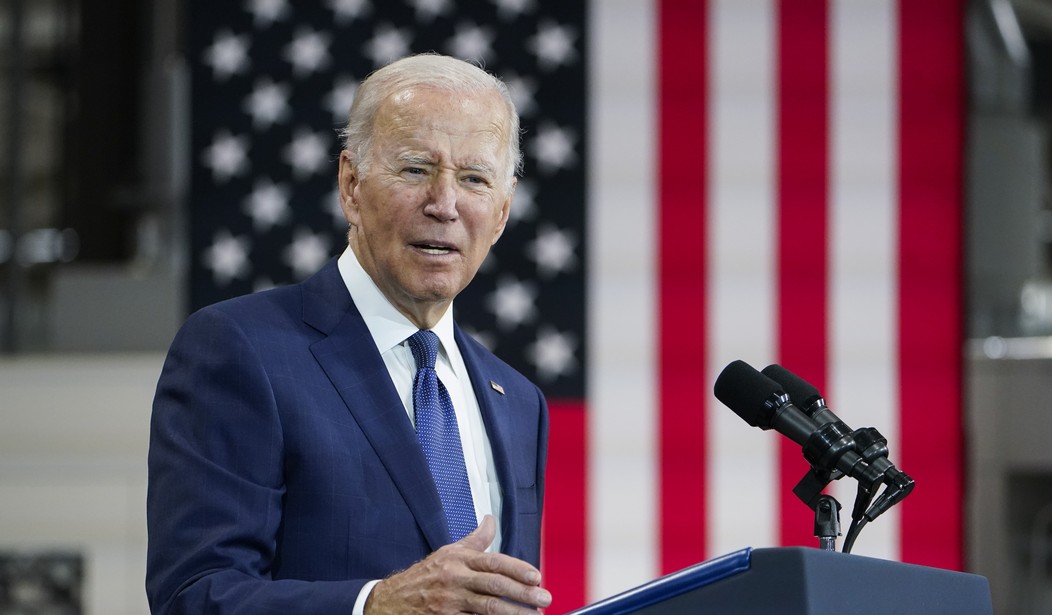With just one week left until the deadline for railroad companies to reach a deal with 12 rail unions or else a nationwide strike will kick off, the White House doesn't seem to know what it's actually doing to help avert a strike — a strike that Biden already took a victory lap for supposedly averting in September.
The confusion may have gotten buried over the long Thanksgiving weekend, but President Joe Biden contradicted his own press secretary Karine Jean-Pierre and her claims about what Biden and his administration have been doing to try and prevent a strike that would cost the U.S. economy as much as $2 billion per day and grind roughly one-third of freight to a halt.
On Thanksgiving Day, as President Biden was speaking with reporters during his long weekend jaunt to Nantucket, he explained, regarding the rail dispute, that his "team has been in touch with all the parties, and in [a] room with the parties and I have not directly engaged yet because they're still talking." So, the Biden administration is "in touch" with the unions and rail companies — whatever that means — but the president himself is not engaged in the process because negotiations are ongoing. Or, at least that's Biden's version of things.
But according to White House Press Secretary Karine Jean-Pierre earlier last week on November 22, "the president is indeed involved, directly" in the talks. That point about Biden being "directly involved" in the talks between the unions and rail companies was made and then reiterated a handful more times by Jean-Pierre who insisted that Biden has a hand in the process that he apparently botched the first time before he falsely claimed the "tentative" agreement that was reached in September was a "win for America" before it completely fell apart last week.
Recommended
This week, Karine Jean-Pierre repeatedly insisted Biden has been “directly involved” in rail strike negotiations — but that’s not what Biden said yesterday.
— RNC Research (@RNCResearch) November 26, 2022
More lies from the Biden administration! pic.twitter.com/Ro2eIrFUMI
So which is it? Is Biden "directly involved" in the negotiations, as his spokeswoman says, or is he "not directly engaged" as Biden himself said? It's another case of "who's on first" for the Biden administration amid a crisis that it promised the American people it had already handled — but hadn't.
The looming strike, it's worth remembering, comes after the Biden administration bragged earlier this fall that its direct hand in the negotiations — including by Biden's Transportation and Agriculture secretaries — had averted the strike in September. But the outcome that Biden touted as a "win" then came only at the 11th hour after he and his administration had been supposedly working to avert the strike since the spring. If months of negotiations that only temporarily delayed the strike — conveniently until after the midterms — with hours to spare last time, how can Biden and his administration expect to achieve another, actually successful, agreement with one week left?
It seems as though Biden's comments to reporters on Thanksgiving may have been an attempt to distance himself from the negotiations because he already took his premature victory lap in September and doesn't want to be tied to the ultimate failure of those negotiations, regardless of whether or not he actually was directly involved in them this time around.
As the window to reach an agreement to avert a nationwide rail strike closes, it may be up to Congress to intervene under authority they have to require a "cooling off" period to temporarily delay a strike again, or just outright force a contract on the unions. The latter might seem unpalatable to Democrats who still control Congress for a few more weeks, but the potential hit for undermining the unions might be less damaging than allowing a strike that would make the economy even worse.

























Join the conversation as a VIP Member